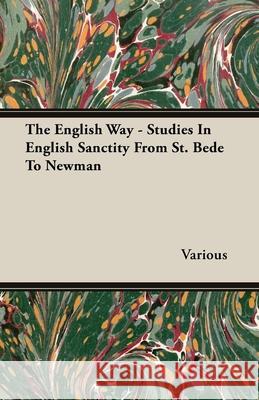The English Way - Studies In English Sanctity From St. Bede To Newman » książka
The English Way - Studies In English Sanctity From St. Bede To Newman
ISBN-13: 9781443720984 / Angielski / Twarda / 2008 / 336 str.
The English Way - Studies In English Sanctity From St. Bede To Newman
ISBN-13: 9781443720984 / Angielski / Twarda / 2008 / 336 str.
(netto: 201,37 VAT: 5%)
Najniższa cena z 30 dni: 208,56
ok. 16-18 dni roboczych.
Darmowa dostawa!
ENGLISH WAY- Studies in English Sanctity from. St. Bede to Newman by . C DARGY. Originally published in 1933. Contents include: FOREWORD By Gervase Mathew, O. P. ... 9 St. Boniface By Fr. Aelfric Manson, O. P. ... 24 Alcuin By Douglas Woodruff .... 44 Alfred the Great By G. KL Chesterton .... 56 St. Wulstan of Worcester By Dom David Knowles, O. S. B. . . 65 St. Aelred ofRievaulx By Fr. Bede Jarrett, O. P ..... 81 St. Thomas of Canterbury By Hilaire Belloc ..... 104 Dame Julian of Norwich By E. I. Watkin ..... 128 William Langland By Christopher Dawson , . .159 John Fisher By David Mathew . . . 195 Thomas More By G, K. Chesterton 209 Edmund Campion By C, C. Martindale, S. J. . . .218 5 CONTENTS Mary Ward PAGE By Maisie Ward ..... 242 Richard Crashaw ByE. I. Watkin 268 Bishop Challoner By Michael Trappes-Lomax . . .297 Cardinal Newman By M. C. DArcy, S J 318. FOREWORD: CHRISTIANITY is the religion of the Incarnation of Godhead in humanity, of the Absolute in the relative, of Eternity in time. Because it is universal it is in every country, but because it is sacramental it is intensely local, found in each country in a special and unique fashion, not a spirit only but a spirit clothed in material form. St. Gregory, as we know, once counselled St, Augustine not to destroy the temples which had been used for pagan worship but to consecrate them to Christ. So, too, the Englishman was not to be changed for but into the Christian. The Mediaevals were wont to paint the Infancy and the Passion of Our Lord in the setting of their own lives, and William Langland saw Christ walking in the fields in the dress of an English labourer. In Langland, says Christopher Dawson, Catholic faith and national feeling are fused in a single flame. This book does not attempt to analyse the English Way of being Catholic, but to present certain characters, certain ideas, from which the reader may make his own analysis and paint his own picture. The various writers have chosen characters who in their opinion are very English and very Catholic. There have been two sharp breaks in the national life the first was at the Norman Conquest the second was at the Reformation, when the national and religious life ceased to flow in the same full stream. But something remained unchanged right through. Phrases from Mr. Chestertons study of Alfred the Great would find them selves at home in the study of Challoner supremely the type that proves to the world what is called a fanatical fixity of faith without fanaticism . . . in which solitary and supernatural conviction expresses itself in energy but not often in ecstasy There is always something about him indescribably humble and handy, like one who unpretentiously hammers away at an inherited task. What we call England, says Mr. Belloc, was made, grew from, began, upon a Sussex hill in 1066. Not that the blood which we call English began then and God knows not the landscape nor the deep things which inhabit the native soul. All these are immemorial the English imagination, the English humour, the English Englishry is from the beginning of recorded time. Those deep things which inhabit the native soul make in each land its own special Way of being Catholic. MAISIE WARD. GERVASE MATHEW, O. P











